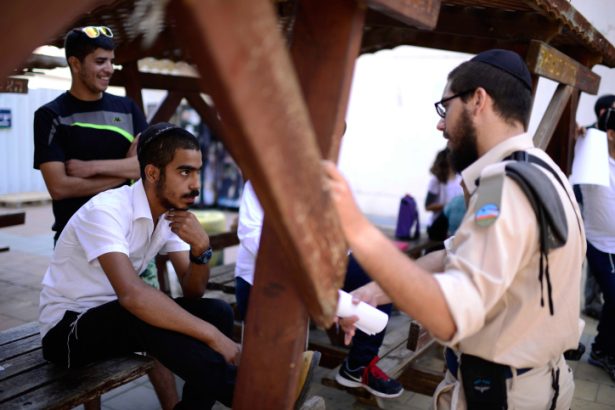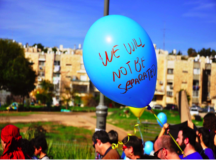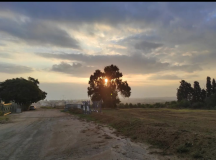Sam Shube resides in a Kibbutz on Israel’s border with the Gaza Strip. He argues US sanctions on violent, right-wing military units were an opportunity to draw the line between armed agents of a pernicious annexationist ideology and the hundreds of thousands of Israeli citizens who flew in from abroad or left the comfort of their homes, families and businesses to defend their country in this, the most just of Israel’s defensive wars. Sanctions could have stopped the ‘Balkanisation of the IDF before it becomes politically invulnerable to change. Gantz, basking in the military halo of a wartime, national consensus, took the easy way out. Good luck fixing it later on.’
Last week’s Axios report of impending sanctions on the notorious Netzach Yehuda battalion – subsequently walked back by Secretary of State Blinken – came as a surprise here in Israel. Benny Gantz’s spirited public defence of the unit did not. The former IDF chief built his entire political brand, starting from the military-khaki design of his initial party logo, around Israel’s enduring public confidence in the IDF. Despite its humiliating failure on 7 October, twice as many Israeli Jews trust the army as they do the Supreme Court, according to the Israel Democracy Institute, almost three times as many as trust the press, and four times as many as express confidence in the Knesset. Military service is, after all, formative to the identity of Jewish adults in Israel, and reserve duty is the country’s most ubiquitous expression of public service. The IDF officer corps, for its part, has traditionally embodied the nation’s centrist-liberal consensus. Commanders for Israel’s Security, for instance, representing 500 retired officers and security personnel, regularly decries the government’s policy of creeping annexation on the West Bank. In an era when a racist hooligan whom the army refused to draft serves as Minister of National Security, the military establishment might seem to be Israel’s final bulwark against political extremism.
In defending Netzach Yehuda, Gantz appealed to the integrity of Israel’s legal system which, he said, ‘evaluates meticulously any claim of a violation or deviation from IDF orders and code of conduct.’ Would that this were true. Just days before the Axios scoop hit the press, settler extremists launched a wave of pogroms in the West Bank villages of Mughayir and Duma in retaliation for the murder of a settler youth. Yediot Ahronot photographer Shaul Golan, who was on the scene, reports that he was beaten and robbed as IDF forces looked on, protecting the rioters instead of their Palestinian victims. The formidable IDF has, it turns out, been cowed into passive acquiescence by right wing pressure. Outgoing OC Central Command Maj. Gen. Yehuda Fox, for instance, was subject to a relentless campaign of character assassination for being insufficiently cooperative with the settlers. One picture floating around social media has him wearing SS garb, a haunting reminder of events that preceded the Rabin assassination. Last week Fox resigned his position without public explanation. Perhaps his memoirs will tell the full story one day.
To be fair, the IDF general staff has made some effort to deal with extremism within its ranks. In December, it suspended operation of the so-called Sfar Hamidbar trackers unit for egregious acts of brutality towards Palestinians. Earlier that month, an alumnus of the same unit shot dead Yuval Castelman as he crouched on his knees, hands in the air at the scene of a terrorist attack, pleading for his life. The shooter mistook Castelman for a surrendering Palestinian, whom he apparently considered a legitimate target. In fact, Castelman was an Israeli who had just shot one of the terrorists, saving innumerable lives.
The ongoing degradation of basic military norms can be attributed, at least in part, to Prime Minister Netanyahu himself. In 2016, he embraced the family of Elor Azaria, a soldier court-martialed for similarly executing a wounded Palestinian assailant as he lay in the street, helpless and bleeding. No less important than Bibi’s rank populism, however, is the internal composition of the trackers unit whose members consist of ‘hilltop youth,’ the most extreme and violent element of the settler population. One hilltop youth, Amram Ben Uriel, was convicted of an arson attack that killed three West Bank Palestinians in 2015. An Israeli journal has documented 11 cases in which the trackers physically abused West Bank Palestinians. No-one should be surprised, then, when a unit based on young men from this demographic violates human rights. The theory behind this dangerous recruitment policy is that uniforms and guns will somehow mainstream these skinhead-like punks in religious garb. In practice, it simply provides justification for sociologically homogeneous units with extremist ideologies but little commitment to the rule of law.
While the suspended trackers’ unit is small, Netzah Yehuda is a battalion sized infantry formation, currently fighting in the Gaza Strip. This may explain why Israel’s establishment has closed ranks behind them. What concerns the US government, however, is something else: the abuse and subsequent death while in their custody of Omar-Assad, an 80 year old American citizen. Fully aware of how reckless the group is, the IDF pulled Netzah Yehuda out of the West Bank a year ago and posted them in the Golan Heights so as to minimise their contact with Palestinians. Former IDF Chief of Staff Aviv Kochavi expressed disgust after four battalion soldiers were filmed beating Palestinian civilians last summer. And in 2019, 18 battalion members were arrested by military police for attacking Bedouin citizens of Israel – not in the occupied territories, but within Israel’s borders. Like the trackers, Netzah Yehuda recruits a niche group – in this case ostensibly haredi (ultra-Orthodox) youth. In practice, it attracts the least disciplined members of that community, those without the ability or inclination for ongoing Torah study – the sin qua non of responsible male haredi adulthood. Beyond the watchful eyes of rabbinical authorities back home, the boys of Netzach Yehuda – most of whom are settlers themselves – live in an insular world where racist ideology germinates and violence becomes a way of life.
Sfar Hamidbar and Netzah Yehuda may be harbingers of a longer-term process: the Balkanisation of the IDF. According to media reports, the Defence Ministry now plans to recruit armed haredi security teams for ultra-Orthodox settlements, consisting of young men with little or no military training. Hagar Sheizaf of Haaretz found disturbing evidence that officials may overlook a candidate’s police record if his infractions were committed as part of the hilltop youth. This proliferation of armed units with doubtful allegiance to the IDF chain of command and none to the democratic ethos of the Jewish State may serve Israel’s immediate manpower needs at a time of conflict, particularly if the human rights of occupied Palestinians are not factored in. When the time comes to make painful decisions, however, about evacuating West Bank settlements or illegal outposts, it is anyone’s guess where these militia will point their guns.
US sanctions on violent, right-wing military units were an opportunity to draw the line between armed agents of a pernicious annexationist ideology and the hundreds of thousands of normative Israeli citizens who flew in from abroad or left the comfort of their homes, families and businesses to defend their country in this, the most just of Israel’s defensive wars. Sanctions could have pulled Israel’s chestnuts out of the fire and stopped the Balkanisation of the IDF before it becomes politically invulnerable to change. Gantz, basking in the military halo of a wartime, national consensus, took the easy way out. Good luck fixing it later on.




































